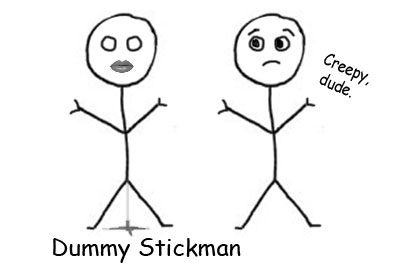
In a previous post, I wrote about pronouns and antecedents and identified the most common problems with vague antecedents. Remember, pronouns are words like I, you, their, me, and him, and antecedents are the words pronouns refer to, like the kids in this sentence: “The kids didn’t realize we could see them in the mirror.”
Improper placement of pronouns and antecedents in sentences and paragraphs can leave readers wondering what the pronouns are referring to, like here: “The obnoxious kids stomped on them because the cookies weren’t good.” Wait, whom (or what) got stomped on? The anticipatory pronoun (“them” before “the cookies”) should be changed to make the sentence easier to understand: “The obnoxious kids stomped on the cookies because they weren’t good.”
Another situation with pronouns and antecedents involves something called the dummy subject, a pronoun that that lacks an antecedent; it stands in for a subject that is implied or comes later in the sentence, and it is called the dummy subject because it is replacing an actual, specific subject.
Get a free sample proofread and edit for your writing.
Two professional proofreaders will proofread and edit your writing.
Ex. There are cookie crumbs all over the floor.It is frustrating to find such a big mess.
In the first example, there stands in for cookies, which comes later. In the second sentence, it stands in for to find this mess. We can see how this works if we rewrite these sentences with the subjects first.
Ex. Cookies are all over the floor. To find this mess is frustrating.
Sentences with dummy subjects are perfectly correct and are very common in English, particularly in sentences describing time, weather, distance, and existence of something in a particular location.
Ex. It was 5 o’clock when I found the cookie mess on the floor. It had been snowing for hours, and it was five miles to the nearest bakery. There were no more cookies in the house other than the crumbs on the floor.

In these examples, the dummy subject is used either because it is part of a common expression (time, weather, etc.) or because not using a dummy subject would be awkward (except, perhaps, to Yoda and his followers), as in “To find this mess is frustrating.” At the same time, using the dummy subject in certain expressions can have a similar awkward effect, like here: “It was sadness I was feeling about the lack of clean and unbroken cookies in the house.” “I was sad” is so much simpler and more natural sounding; in this case, there is an obvious, active subject (I), and in such cases it is best to go with the true subject rather than the dummy subject.
In my work as an editor, for which I read a lot of student and other academic and formal writing, I find that the dummy subject is overused. Sentences like these come up a lot:
These sentence, while grammatically correct, are examples of when the dummy subject adds unnecessary fluff to a sentence, thus distracting readers from the point and muddling the writer’s meaning. Here is what these sentences look like without the dummy subjects:
Sentences with specific subjects do a better job guiding your readers on their journey to your point. So, when writing, if you find a sentence beginning with “It is/was/must have been/etc.” or “There are/were/wouldn’t have been/etc.,” stop and consider whether it would be best to rewrite the sentence with a specific subject instead of a dummy subject.
Looking for more about ways to keep your writing cleaner, clearer, and more precise? See Nick’s previous post on avoiding wordiness by eliminating redundant words and phrases, unnecessary prepositions, and passive voice and using simple verb forms.
Sarah P.
Get a free sample proofread and edit for your writing.
Two professional proofreaders will proofread and edit your writing.
Get a free sample proofread and edit for your document.
Two professional proofreaders will proofread and edit your document.
We will get your free sample back in three to six hours!